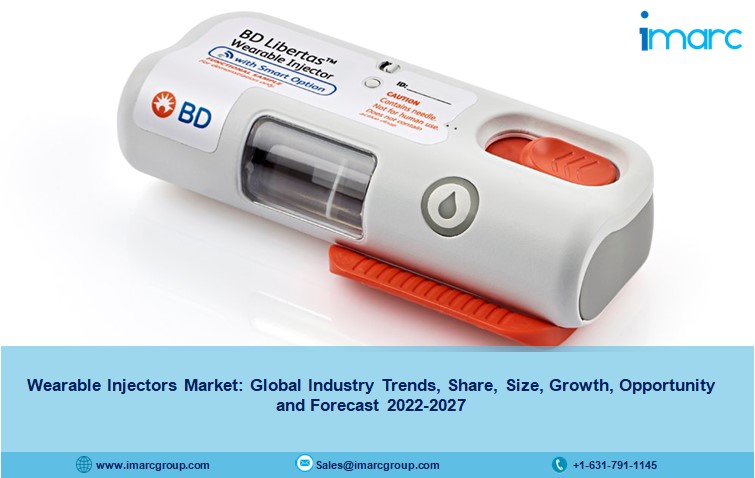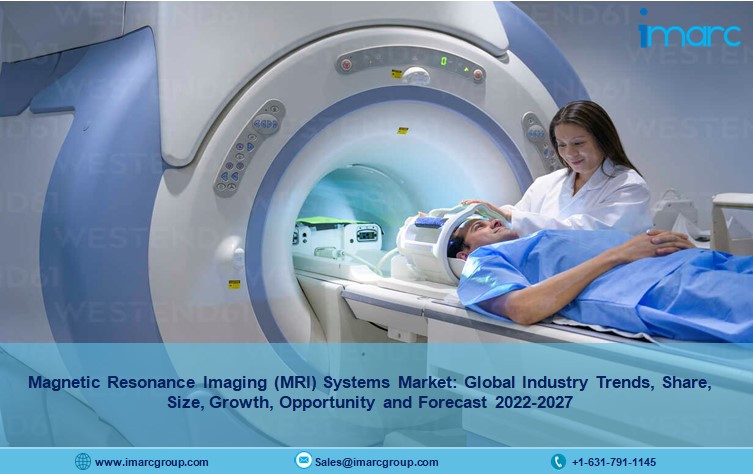According to the latest report by IMARC Group “Wearable Injectors Market: Global Industry Trends, Size, Share, Growth, Opportunity and Forecast 2022-2027“, The global wearable injectors market reached a value of US$ 5.7 Billion in 2021. Looking forward, IMARC Group expects the market to reach US$ 14.4 Billion by 2027, exhibiting a CAGR of 16.75% during 2022-2027.
Wearable injectors, also known as patch pumps or bolus injectors, are drug delivery devices used for subcutaneous injection of larger volumes of biologics and drugs. They consist of an adhesive that helps fix the device on the patient skin and a drive system to deliver appropriate volumes of the drug. They are compact, disposable, safer, cost-effective, user-friendly, and cause minimal discomfort and pain as compared to conventional injecting practices. They are resistant to heat, chemicals, weather, radiation, moisture, and oxygen. Besides this, they are single-use systems that are comfortably worn on the body during the dosage injection and enable patients to self-administer large dose therapies. As a result, wearable injectors are widely used in the treatment of cancer, rheumatoid arthritis, diabetes, and cardiovascular diseases.
Request for a free sample copy of this report: https://www.imarcgroup.com/wearable-injectors-market/requestsample
Note: We are regularly tracking the direct effect of COVID-19 on the market, along with the indirect influence of associated industries. These observations will be integrated into the report.
Market Trends:
The growing global population and increasing prevalence of chronic medical ailments, such as diabetes, and oncological and cardiovascular disorders, represent one of the key factors positively influencing the market. These chronic diseases need accurate dosage delivery of various formulations at regular time intervals. Additionally, the escalating demand for home-based treatment, especially among the geriatric population, is increasing the need for wearable injectors to reduce hospital visits and the risk of hospital-acquired infections.In line with this, the rising traction of self-injecting devices that are user-friendly and do not need any supervision or additional equipment is catalyzing the demand for wearable injectors.
Apart from this, the rising geriatric population, which is more susceptible to ailments, and increasing demand for minimal invasive (MI) treatments, are strengthening the market growth. Moreover, wearable devices facilitate increased connectivity between digital health platforms and allow communication with different electronics, which offersa wide range of digital control. For instance, in the case of diabetes, the device interfaces with other external devices like glucose meters to monitor and adjust the insulin delivery profile. Besides this, significant improvements in the healthcare infrastructure and the increasing adoption of advanced technologies, such as the integration of wireless and Bluetooth connectivity and artificial intelligence (AI),to expand the functionality of the device are offering a favorable market outlook. These technologies allow convenient patient monitoring and timely reminders for dosage through smartphone applications. Furthermore, leading manufacturers are constantly putting efforts to develop customized and miniaturized devices. They are alsoincreasing investments in research and development (R&D) activities to make the device lighter while maximizing the space inside the machine, which is anticipated to drive the market in the coming years.
Breakup by Type:
- On-body
- Off-body
Breakup by Technology:
- Spring-based
- Motor-driven
- Rotary Pump
- Expanding Battery
- Others
Breakup by Application:
- Oncology
- Infectious Diseases
- Cardiovascular Diseases
- Autoimmune Diseases
- Others
Breakup by End Use:
- Hospitals and Clinics
- Home Care
- Others
Market Breakup by Region:
- North America (United States, Canada)
- Asia Pacific (China, Japan, India, South Korea, Australia, Indonesia, Others)
- Europe (Germany, France, United Kingdom, Italy, Spain, Russia, Others)
- Latin America (Brazil, Mexico, Others)
- Middle East and Africa
Competitive Landscape with Key Player:
- Becton Dickinson and Company
- CeQur SA
- Debiotech SA
- Dexcom Inc.
- Enable Injections Inc.
- Gerresheimer AG
- Insulet Corporation
- Tandem Diabetes Care Inc.
- West Pharmaceutical Services Inc.
- Ypsomed AG.
Ask Analyst for Customization and Browse full report with TOC & List of Figure: https://www.imarcgroup.com/wearable-injectors-market
As the novel coronavirus (COVID-19) crisis takes over the world, we are continuously tracking the changes in the markets, as well as the industry behaviours of the consumers globally and our estimates about the latest market trends and forecasts are being done after considering the impact of this pandemic.
If you want latest primary and secondary data (2022-2027) with Cost Module, Business Strategy, Distribution Channel, etc. Click request free sample report, published report will be delivered to you in PDF format via email within 24 to 48 hours of receiving full payment.
About Us
IMARC Group is a leading market research company that offers management strategy and market research worldwide. We partner with clients in all sectors and regions to identify their highest-value opportunities, address their most critical challenges, and transform their businesses.
IMARC’s information products include major market, scientific, economic and technological developments for business leaders in pharmaceutical, industrial, and high technology organizations. Market forecasts and industry analysis for biotechnology, advanced materials, pharmaceuticals, food and beverage, travel and tourism, nanotechnology and novel processing methods are at the top of the company’s expertise.
Contact US
IMARC Group
30 N Gould St Ste R
Sheridan, WY 82801 USA – Wyoming
Email: [email protected]
Tel No:(D) +91 120 433 0800
Americas:- +1 631 791 1145 | Africa and Europe :- +44-702-409-7331 | Asia: +91-120-433-0800, +91-120-433-0800



